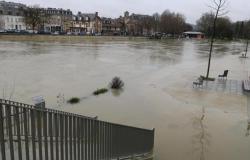If the 1.5°C threshold is exceeded for a century, sea levels could rise by an additional 40 centimeters.
AFP
Any warming of the climate, even temporary, beyond 1.5°C, the limit deemed safest by scientists, would lead to “irreversible consequences” for the future of humanity, concludes a vast study published Wednesday in “ Nature”.
This warning, the result of 3 years of work carried out by 30 international scientists, responds to an increasingly topical question given the delay taken by humanity in reducing its greenhouse gas emissions: since the limit of 1.5°C set by the Paris agreement sometimes seems compromised, should we not resolve to see this threshold exceeded for a few decades before a possible cooling of temperatures?
No, scientists respond, such a scenario, nicknamed “overshoot”, is not the same as doing everything to stop global warming, because it could lead to “irreversible” repercussions, lasting for millennia.
In such a trajectory, “tipping points” would be reached, such as the thawing of permafrost and peatlands, two immense carbon reservoirs which, if they disappeared, would release enormous volumes of greenhouse gases which would warm the planet .
If the 1.5°C threshold is exceeded for a century, sea levels could rise by an additional 40 centimeters, which would become a question of life and death for island nations, say the authors, for example. .
The world would no longer be the same
“Even if we brought temperatures back down, the world we live in would no longer be the same as if we had not exceeded the limit,” explains Carl-Friedrich Schleussner, researcher at the International Institute of applied systems analysis (Austria) who led the team.
According to the United Nations, all countries’ climate commitments are leading the world to a warming of nearly 3°C by 2100 compared to the pre-industrial era.
Humanity’s greenhouse gas emissions are nearing a peak, but the decline has not yet begun while they must be cut by almost half by 2030 to hope to meet the limit of 1.5°C.
Such a target, however, would be just one step on the road to achieving carbon neutrality by 2050, when natural carbon sinks and technology will absorb as much greenhouse gas as the amount released by human activity.
Given the delay, some scientists and political decision-makers now consider it inevitable to cross this 1.5°C threshold. For Mr. Schleussner, these results reinforce “the urgency for governments to act to reduce emissions now and not later, in order to keep the warming peak as low as possible.”
(afp)






